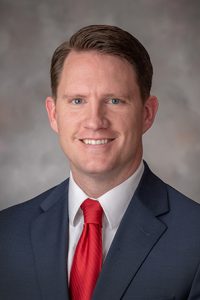Newborn screening exemption proposed
Nebraska parents would be able to opt their newborns out of screenings for over 60 genetic conditions under a bill considered by the Health and Human Services Committee Jan. 31.

Current law requires that all infants born in the state be screened for various genetic disorders before they can be released from a hospital or birthing facility. The state Department of Health and Human Services is required to incinerate all samples 90 days after collection unless a family otherwise requests the sample for personal use or to be used for research purposes.
Under LB1060, introduced by Sen. Ben Hansen of Blair, parents would be able to opt their newborn out of these screenings.
Hansen said 47 other states inform parents about the benefits of newborn screening and trust their decision, while Nebraska forces infants to undergo an “invasive” test that violates some parent’s philosophical and religious beliefs.
“I’m not arguing the benefits of the procedure or early detection,” he said. “[but] I can’t think of any other medical procedures that are forced upon infants.”
Speaking in support of LB1060, Shannon Splonskowski described her experience of giving birth under the current mandate. She said her daughter had to be screened before the two were allowed to leave the birthing center, even though tests conducted within 24 hours of a child’s birth are not considered accurate. This meant that her daughter had to undergo screening a second time during the midwife’s first in-home visit in order to achieve accurate results, she said.
“If I wanted to have the freedom to be able to use the midwives for future pregnancies and deliveries, I would have to … put my baby through the trauma of multiple pricks for no reason,” Splonskowski said.
Jacy Ruwe also spoke in support of the measure, saying a child’s health is their parent’s responsibility, not the state’s. The current newborn screening process violates parent’s rights, and sets a dangerous precedent regarding medical privacy, she said.
“I believe this screening should be akin to genetic testing in the womb — available to those who want it, but certainly not mandated,” Ruwe said. “If our children are to be used as lab rats, we parents should get a say in whether or not they participate.”
Testifying in opposition to LB1060 was Timothy Tesmer, chief medical officer for the state Department of Health and Human Services. Tesmer said the current newborn screening mandate is driven by the importance of early detection, intervention and treatment, which often can prevent or minimize the development of severe symptoms and complications.
Late detection often leads to more advanced stages of a condition, he added, which can require intensive medical intervention, hospitalization, surgery and ongoing treatment.
“The current mandate is crucial because the disorders screened for … cause severe health problems, including death,” Tesmer said. “These disorders are treatable and would often remain undetected until symptoms manifest.”
Also speaking in opposition to LB1060 was Robin Linafelter, who said the newborn screening saved his daughter’s life. Although the baby appeared to be completely healthy at birth, Linafelter said, the family was notified of her condition when she was three days old.
“We knew right away [that] left undiagnosed, she would potentially live a life with irreversible brain damage,” he said. “Had we opted out [of] the screening, the outcome would have been totally devastating.”
Ann Anderson Berry, medical director for the Nebraska Perinatal Quality Improvement Collaborative, also testified against the proposal. Representing the Nebraska Medical Association, she said the state’s time to treatment — or the time between a diagnosis and the start of treatment — is significantly lower than the regional and national averages.
Without newborn screening, Anderson Berry estimated the state’s time to treatment would be extended significantly because families would wait until symptoms appear before seeking care, causing physicians to go through a complicated diagnostic process.
The committee took no immediate action on LB1060.


